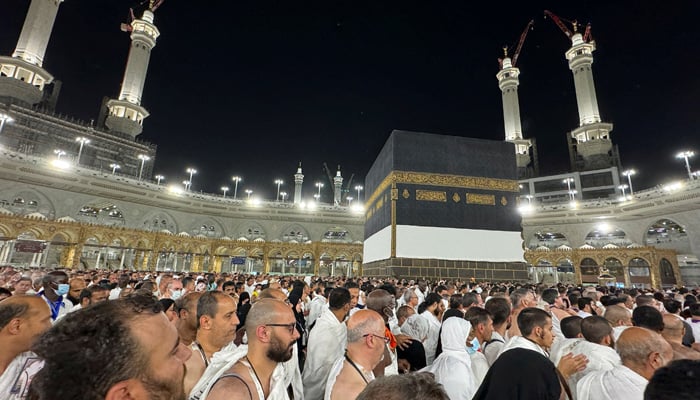Select Language:
In preparation for welcoming over a million Hajj pilgrims despite the intense summer heat, Saudi authorities are implementing advanced artificial intelligence, additional shading, and misting systems.
Saudi Arabia’s Hajj Minister, Tawfiq al-Rabiah, informed AFP Thursday that addressing the extreme desert temperatures remains a primary concern for officials and organizers as the pilgrimage approaches.
“Year after year, we face the challenge of rising temperatures, and we prioritize this issue highly,” he stated in an exclusive interview in Riyadh.
This issue has gained urgency following last year’s Hajj, during which over 1,300 pilgrims tragically lost their lives as temperatures soared to 51.8 degrees Celsius (125.24 degrees Fahrenheit).
This year, Rabiah mentioned that more than 40 government agencies and 250,000 personnel are mobilized to enhance efforts aimed at reducing heat-related dangers.
Authorities have expanded shaded areas by 50,000 square meters (12 acres), increased the number of medical staff, and will deploy over 400 cooling units throughout the pilgrimage period, Rabiah added.
These initiatives build on improvements made in previous years, which involved renovating areas around the Grand Mosque and applying a special coating on asphalt surfaces to lower ground temperatures.
“These new efforts will significantly contribute to the safety and enhanced experience of pilgrims during Hajj,” Rabiah noted.
This week, he reported that over a million individuals from around the world have already made their way to Saudi Arabia for the Hajj, with more expected to arrive.
Last year, the pilgrimage saw 1.8 million pilgrims gather in Makkah.
Permit Enforcement
New AI technologies will assist in monitoring the vast amounts of data and videos, including footage from a newly added fleet of drones, across Makkah.
Past crowd management has proven dangerous, notably in 2015 when a stampede resulted in around 2,300 fatalities.
In addition to expanding infrastructure and increasing personnel, Saudi officials are rigorously enforcing entry rules to prevent unpermitted pilgrims from accessing Makkah.
Officials reported that more than 80% of last year’s Hajj-related deaths were among pilgrims without proper permits, which restricted their access to vital services, including air-conditioned tents.
Hajj permits are issued based on a quota system allocated to various countries and then distributed to individuals through a lottery process.
Even for those who secure permits, the high costs often compel many individuals to attempt the pilgrimage without proper documentation, risking arrest and deportation if discovered.
To manage the influx of unauthorized pilgrims entering Makkah, authorities have initiated raids, launched extensive media campaigns, and increased penalties for violations, including a potential ten-year ban from the kingdom.
The pilgrimage is set to commence on June 4 and will span at least four days, primarily taking place outdoors.
The Hajj is one of the five pillars of Islam, mandatory for every Muslim who is physically and financially able to undertake it at least once in their lifetime.







